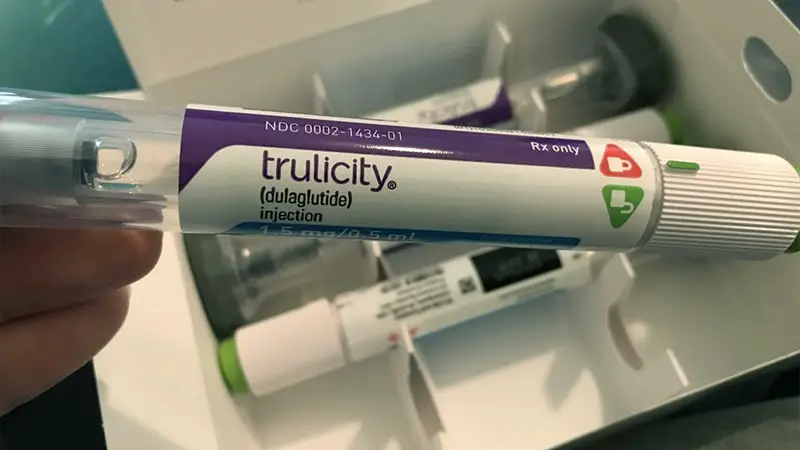Fatigue is a common complaint among individuals living with type 2 diabetes, and for some, the introduction of medications like Trulicity (dulaglutide) can bring about unexpected tiredness.
While Trulicity is highly effective in managing blood sugar levels, the question that often arises is, “Why does Trulicity cause fatigue?” In this blog post, we aim to shed light on this important issue.
Trulicity is a medication that belongs to the class of GLP-1 receptor agonists, renowned for their blood sugar-lowering properties. But as with any medication, side effects can occur.
Understanding the underlying reasons behind Trulicity-induced fatigue is crucial, as it can help individuals better manage their diabetes while mitigating this unwelcome symptom.
Join us on this journey as we delve into the potential mechanisms behind Trulicity-related fatigue, explore who might be most affected, and discover practical strategies to cope with and alleviate this side effect.
What is Trulicity?

Trulicity is the brand name of a prescription medication called dulaglutide. It is a medication used to treat type 2 diabetes. Trulicity belongs to a class of drugs known as glucagon-like peptide-1 receptor agonists (GLP-1 RAs).
Here’s how Trulicity works and what it is used for:
Mechanism of Action
Trulicity works by mimicking the action of a naturally occurring hormone called glucagon-like peptide-1 (GLP-1).
GLP-1 helps regulate blood sugar levels by stimulating the release of insulin, slowing down the absorption of glucose from the intestines, and reducing the production of glucose in the liver.
Treatment of Type 2 Diabetes
Trulicity is primarily prescribed to people with type 2 diabetes to help control their blood sugar levels.
It is usually used in conjunction with diet and exercise and may be prescribed alone or in combination with other diabetes medications, such as metformin or insulin.
Administration
Trulicity is typically administered as a subcutaneous (under the skin) injection. It is usually given once a week, which can make it more convenient for some patients compared to daily medications.
Benefits
Trulicity can help lower hemoglobin A1c levels, which is a measure of average blood sugar control over several months.
It may also lead to weight loss in some people and has been associated with a lower risk of heart-related events in certain patient populations.
It’s important to note that Trulicity is not used to treat type 1 diabetes or diabetic ketoacidosis, and it is generally prescribed by healthcare professionals based on individual patient needs and medical history.
As with any medication, Trulicity can have potential side effects, so it should be used under the guidance and supervision of a healthcare provider who can monitor its effectiveness and manage any adverse reactions.
The Connection between Trulicity and Fatigue

Fatigue is a potential side effect associated with Trulicity (dulaglutide), a medication for type 2 diabetes.
While not everyone experiences this symptom, some individuals may report increased tiredness or fatigue while using Trulicity.
The exact mechanism behind this side effect is not fully understood, but it may be related to the way Trulicity affects blood sugar levels and metabolism.
When blood sugar is well controlled, some people may feel more energy, but others may experience fatigue as their bodies adjust to the medication.
It’s crucial for individuals with Trulicity to communicate any unusual or severe fatigue to their healthcare providers, as it might be a sign of an underlying issue.
Healthcare professionals can help assess and manage this side effect, potentially adjusting treatment or addressing other contributing factors. The relationship between Trulicity and fatigue can vary from person to person.
Why Does Trulicity Cause Fatigue?
The exact cause of fatigue as a side effect of Trulicity (dulaglutide) is not fully understood, and it may result from various factors associated with the medication’s mechanism of action and its effects on the body.
Here are some possible reasons why Trulicity might lead to fatigue:
Blood Sugar Regulation
Trulicity is a medication that helps regulate blood sugar levels in individuals with type 2 diabetes. It does this by increasing the release of insulin and reducing the production of glucose by the liver.
In some cases, these actions can lead to fluctuations in blood sugar levels. Low blood sugar (hypoglycemia) can cause symptoms like fatigue, weakness, and shakiness.
Gastrointestinal Effects
Trulicity is known to have gastrointestinal side effects, including nausea, diarrhea, and abdominal discomfort.
These symptoms can lead to a general feeling of discomfort and weakness, contributing to fatigue.
Individual Sensitivity
People’s responses to medications can vary widely. Some individuals may be more sensitive to the effects of Trulicity, including its potential to cause fatigue.
Factors such as genetics, overall health, and other medications being taken can influence individual responses.
Dosing and Timing
The timing of Trulicity injections may affect how individuals feel. For example, if someone experiences side effects like fatigue shortly after taking the medication, it might be related to the timing of the dose.
Other Factors
Fatigue can have numerous causes beyond medication side effects. Lifestyle factors, such as poor sleep, stress, or lack of physical activity, can also contribute to fatigue, and these factors may be unrelated to Trulicity.
It’s important to note that not everyone who takes Trulicity will experience fatigue, and for some individuals, the benefits of improved blood sugar control may outweigh any potential side effects.
If you or someone you know is experiencing fatigue while taking Trulicity, it is essential to discuss this with a healthcare provider.
They can assess whether the fatigue is related to the medication, adjust the dosage if necessary, and explore other potential causes.
It’s crucial to follow the healthcare provider’s guidance when taking Trulicity and report any concerning or persistent side effects promptly.
Tips for Managing Trulicity-Induced Fatigue

Managing fatigue associated with Trulicity (dulaglutide) can be essential to maintain a good quality of life while effectively managing type 2 diabetes.
Here are some tips to help you cope with Trulicity-induced fatigue:
Talk to Your Healthcare Provider
The first step should always be discussing your fatigue with your healthcare provider.
They can assess whether the fatigue is indeed related to Trulicity and recommend appropriate adjustments to your treatment plan.
Evaluate Your Lifestyle
Assess your daily routine and lifestyle habits. Ensure you’re getting enough sleep, eating a balanced diet, and staying hydrated. These factors can significantly impact your energy levels.
Diet and Nutrition
Proper nutrition is crucial for managing diabetes and combating fatigue. Ensure your diet includes a variety of nutrient-rich foods, with a focus on complex carbohydrates, lean proteins, and plenty of vegetables and fruits.
Hydration
Dehydration can exacerbate fatigue. Be sure to drink enough water throughout the day, as staying hydrated can help maintain your energy levels.
Regular Exercise
Engage in regular physical activity, as recommended by your healthcare provider. Exercise can boost your energy and improve your overall well-being.
Blood Sugar Monitoring
Keep track of your blood sugar levels as advised by your healthcare provider. Fluctuations in blood sugar can contribute to fatigue, so maintaining good control is essential.
Medication Timing
Discuss the timing of your Trulicity injections with your healthcare provider. They may suggest adjustments to minimize fatigue. For instance, taking it at a different time of day might help.
Gradual Adjustment
Sometimes, fatigue can be a temporary side effect as your body adjusts to the medication. Give it some time, and the fatigue may lessen as your body gets used to Trulicity.
Manage Stress
High stress levels can worsen fatigue. Explore stress management techniques like deep breathing, meditation, or yoga to help reduce stress.
Support Network
Lean on your support network, including friends and family. They can provide emotional support and assistance with daily tasks when you’re feeling fatigued.
Monitor for Other Side Effects
Keep an eye out for any other side effects of Trulicity, as these can sometimes contribute to fatigue. Report any new or worsening symptoms to your healthcare provider promptly.
Remember, everyone’s experience with Trulicity-induced fatigue is unique.
What works best for one person may not work for another, so it’s crucial to work closely with your healthcare provider to find the most effective strategies for managing both your diabetes and any associated side effects like fatigue.
Potential Alternatives to Trulicity
There are several potential alternatives to Trulicity (dulaglutide) for the management of type 2 diabetes.
The choice of alternative medication depends on individual factors, including a patient’s specific health profile, preferences, and response to treatment.
Here are some alternatives and their respective classes:
Other GLP-1 Receptor Agonists
Bydureon (exenatide): Another GLP-1 receptor agonist, available in extended-release form, which is administered once weekly.
Victoza (liraglutide): Also a GLP-1 receptor agonist, typically injected once daily.
DPP-4 Inhibitors
Januvia (sitagliptin): A DPP-4 inhibitor that increases insulin secretion and reduces blood sugar levels.
Onglyza (saxagliptin): Another DPP-4 inhibitor used to lower blood sugar levels.
SGLT-2 Inhibitors
Invokana (canagliflozin): Part of the SGLT-2 inhibitor class, these medications help lower blood sugar by causing the kidneys to excrete excess glucose through urine.
Insulin
Various Types: Insulin therapy might be recommended, either alone or in combination with other oral medications or GLP-1 receptor agonists.
Metformin
Glucophage (metformin): Metformin is a common first-line treatment for type 2 diabetes and can be used alone or in combination with other medications.
Sulfonylureas
Glipizide, Glyburide, Glimepiride: These medications stimulate the pancreas to release more insulin.
Alpha-glucosidase Inhibitors
Acarbose: Slows down the digestion of carbohydrates and can help control post-meal blood sugar spikes.
Thiazolidinediones (TZDs)
Actos (pioglitazone), Avandia (rosiglitazone): These medications help improve insulin sensitivity in the body.
Combination Medications
Some medications combine two or more diabetes drugs in a single pill, making it easier to manage treatment.
The choice of an alternative medication should be made in consultation with a healthcare provider who can assess your specific needs, preferences, and the most appropriate treatment strategy based on your medical history and current health status.
Diabetes management often involves a combination of lifestyle changes, dietary modifications, and medications, and it may require some trial and error to find the most effective regimen for an individual patient.
FAQs
Why does Trulicity cause fatigue?
Trulicity may lead to fatigue in some individuals as a side effect. While the exact mechanism isn’t fully understood, it may be related to blood sugar regulation.
As Trulicity helps lower blood sugar levels, some people may experience fatigue as their body adjusts to these changes.
Is fatigue a common side effect of Trulicity?
Fatigue is a known side effect of Trulicity, but it doesn’t affect everyone. Some individuals may experience mild fatigue, while others may not notice any tiredness at all.
If you’re concerned about fatigue while taking Trulicity, discuss it with your healthcare provider.
Can fatigue from Trulicity be managed?
Yes, fatigue associated with Trulicity can often be managed. Strategies include maintaining a healthy lifestyle with good sleep, balanced nutrition, and regular exercise.
Adjusting the timing of your medication or discussing alternative diabetes treatments with your healthcare provider may also help alleviate fatigue.
When should I contact my healthcare provider about Trulicity-induced fatigue?
Contact your healthcare provider if fatigue is severe, persistent, or interferes with your daily activities.
It could be a sign of an underlying issue or a need to adjust your treatment plan. Your provider can assess your condition and recommend appropriate changes.
Can I continue using Trulicity despite fatigue?
In many cases, individuals can continue using Trulicity while managing fatigue through lifestyle adjustments. It’s essential to discuss your concerns with your healthcare provider.
They can help balance the benefits of Trulicity in managing diabetes with any side effects like fatigue, ensuring the best treatment plan for your specific needs.
Wrapping Up
While triplicity offers significant benefits in managing type 2 diabetes, its potential to cause fatigue is a valid concern for some.
By gaining insights into why Trulicity may lead to tiredness and by discussing strategies to address this issue, we can empower individuals to make informed decisions about their diabetes treatment.
Remember, open communication with healthcare providers and a proactive approach to managing lifestyle factors can often help strike a balance between the benefits of Trulicity and the management of fatigue, ensuring a better quality of life for those navigating the challenges of diabetes.
I am sure that you’ve understood the points. Thanks for your support.
Hi, I’m Mark Pattinson and I’m a freelance personal trainer. I’ve been working in the fitness industry for over 10 years especially since I work with diabetes patients and I love helping people achieve their fitness goals. I believe that everyone can benefit from a good workout, and I’ll do everything to make sure you get the most out of your training.